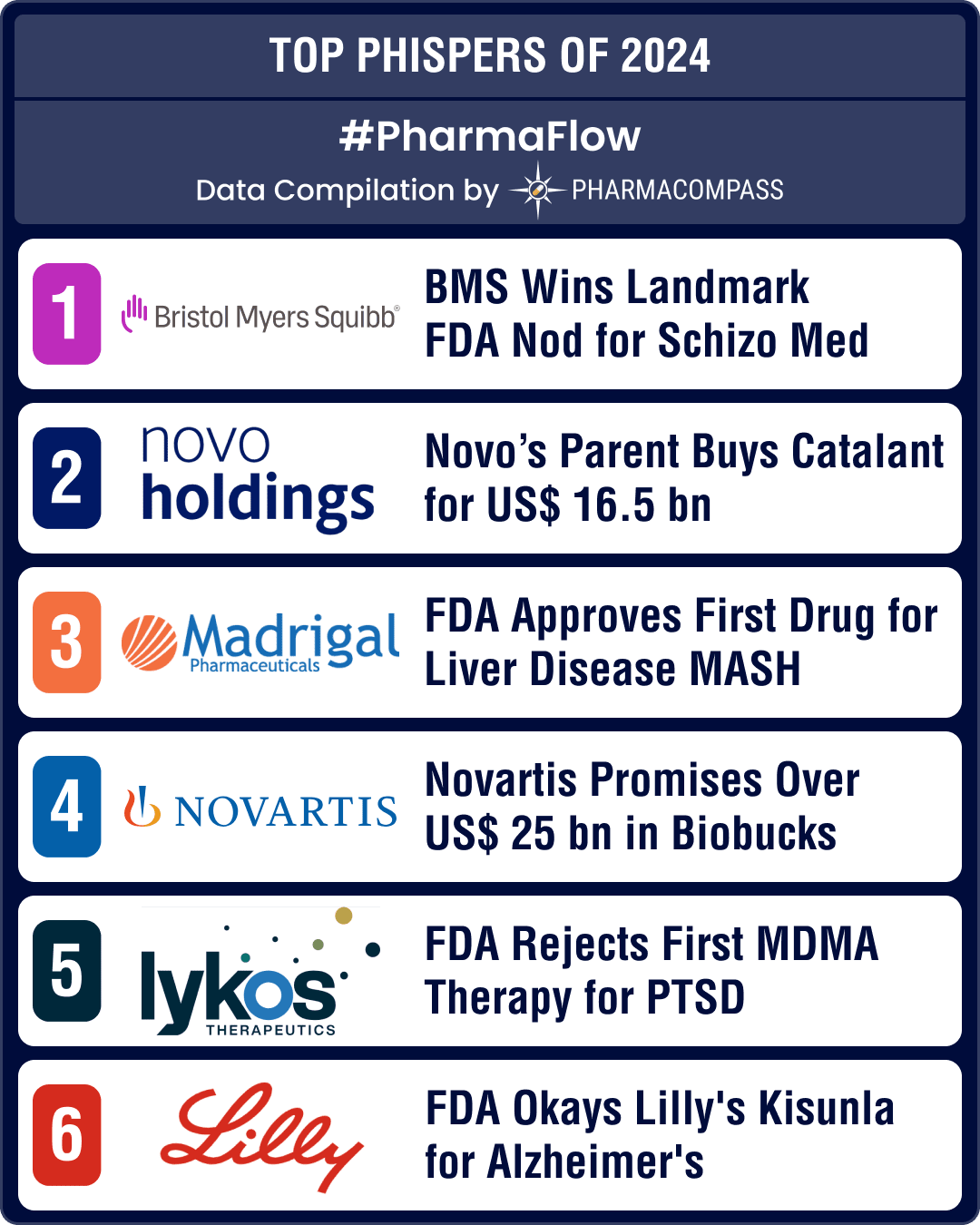
This week’s Phispers takes you through pharmaceutical news from across the globe – from Joe Biden’s computer aided cancer moonshot to AbbVie’s second largest venture capital buyout in history and a lot more.
After GMP troubles, migraine patch gives Teva a fresh headache
Last week, Phispers carried news on Teva’s facility in Hungary, which was placed on the US Food and Drug Administration’s import alert list. The FDA inspection had found the plant not conforming to the current good manufacturing practices (GMPs). This week, there is more bad news for Teva Pharmaceuticals.
The company had bought NuPathe in early 2014 for about US $ 114 million. Through this acquisition, Teva had got its hands on the only migraine patch approved in the US – known as Zecuity. The patch first hit the market in September 2015.
However, in less than a year of its launch, Teva's Zecuity is under the FDA radar for concerns over “serious” adverse events including burning and scarring. Moreover, a large number of users have also reported other problems, such as severe redness, pain, skin discoloration, blistering and cracked skin, the FDA said.
Britain’s Patel brothers do a Martin Shkreli on drugs needed by NHS
While America’s Martin Shkreli faced additional criminal charges this week of conspiracy to commit securities fraud during his tenure as the CEO of Retrophine (2012 to 2014), Britain saw its own avatars of Shkreli.
Millionaire brothers Vijay and Bhikhu Patel, also known as ‘Bollygarchs’ – have been accused of being part of a group of businesses that hike up prices of common drugs needed by the National Health Service (NHS), the publically-funded healthcare system for England.
The Patel brothers have allegedly exploited a loophole in NHS’ pricing system. Today the four businesses, including two with past and present links to the Patel siblings, have allegedly hiked the price of common drugs by up to 12,500 per cent.
The unreasonably high prices have cost the NHS an additional £ 262 million (US $ 381 million) a year. This sum has conveniently gone into the pockets of the Patel siblings and their associates.
Cancer treatment least affordable in India and China
While we all know that Americans pay the highest prices in the world for cancer drugs, a new study highlights how cancer treatments are least affordable in lower income countries.
The study – presented at the annual meeting of the American Society of Clinical Oncology in Chicago – looked at the prices of cancer drugs in seven countries, while not taking into account discounts or rebates.
The lowest drug prices were found in India and South Africa. But then, when adjusted for the cost of living, cancer drugs appeared to be least affordable in India and China.
The study only strengthens the case for politicians, healthcare providers, doctors, insurers and patients, who have been opposing the high prices commanded by modern cancer drugs. Drug companies justify the high prices, citing the high cost of drug research and the need to make profits to continue spending on research and drug development.
Sun Pharma sells two US facilities to Frontida BioPharma
Sun Pharmaceuticals – India’s largest drug maker – is selling off two oral solid dosage manufacturing plants in the US to Frontida BioPharm Inc. (a part of Frontage Pharma). The sell-off is part of Sun Pharma’s plans to consolidate its manufacturing facilities in the US. The plants are situated in Philadelphia and Illinois.
Sun Pharma earns about half of its total revenues from the US.
And this is the drug maker’s second divestment in the US in the last six months. In December, it had divested its manufacturing plant in Ohio to Nostrum Laboratories.
The company is also looking to sell facilities and business units from the Ranbaxy portfolio. In September 2015, it put a plant in Ireland on the block to optimize its overall manufacturing base and also sold the central nervous system business (of erstwhile Ranbaxy) to Strides Shasun for INR 1.65 billion (US $ 24.8 million).
China’s Fosun leads the race for India’s Gland Pharma with US $ 1.27 billion bid
Last week, Hong Kong-listed Shanghai Fosun (Fosun Pharma) revised its offer to buy KKR-backed Gland Pharma to US $ 1.27 billion, the highest so far. American healthcare company Baxter International and private equity fund Advent made their offers in May.
The frontrunner for Gland Pharma, until recently, was Baxter with its bid at US $1.1 billion, a news report said.
Fosun Pharma is part of Chinese billionaire Guo Guangchang’s extensive business empire. Fosun is believed to have completed its due diligence on Gland Pharma sometime last week. Final negotiations are planned for next week, and we hope to hear a formal announcement on Gland Pharma sometime in the third week of June.
Joe Biden launches open-access cancer database as part of the Cancer Moonshot Initiative
On Monday, American Vice President Joe Biden announced the launch of an open-access cancer database that will allow researchers to better understand cancer and develop more effective treatments.
This first of its kind database, a part of the National Cancer Moonshot initiative, known as the Genomic Data Commons (GDC), contains the raw genomic and clinical data of 12,000 patients. The database has detailed analyses of the molecular makeup of cancers and information on which treatments were used and how patients responded.
The database will encourage the much-needed collaboration among scientists in different disciplines to research important aspects of cancer and find new ways to help patients, Biden told doctors.
Medicines containing aspirin can cause stomach bleeding, warns FDA
Aspirin-containing medicines to treat heartburn, sour stomach, acid indigestion, or upset stomach can cause stomach or intestinal bleeding, warns the USFDA.
Since aspirin thins the blood, FDA believes the aspirin in these combination medicines is contributing to major bleeding events. The instances of bleeding, however, are rare.
In 2009, FDA had issued a warning about serious stomach bleeding risk with aspirin and other non-steroidal anti-inflammatory drugs (NSAIDs). When FDA reviewed its Adverse Event Reporting System database, it found eight new cases of serious bleeding caused by aspirin-containing antacid products since the 2009 warning. Some of those patients required blood transfusion. “Take a close look at the Drug Facts label, and if the product has aspirin, consider choosing something else for your stomach symptoms,” an FDA official said.
AbbVie blockbuster buyout disappoints investors
On Sunday, AbbVie began explaining why it paid a whopping US $ 5.8 billion upfront – with US $ 4 billion reserved for milestones – for biotechnology company Stemcentrx and its cancer drug Rova-T (rovalpituzumab tesirine).
AbbVie’s acquisition of Stemcentrx is the second largest venture-capital backed startup acquisition in history, after Facebook paid $19 billion to buyout WhatsApp.
However, the first set of data provided by AbbVie disappointed investors. Although the drug’s performance against small cell lung cancer, a disease which has not seen a change in survival rates since the 1970s, showed that 68 percent of the patients achieved a clinical benefit, the expectations from the investor community were much higher.
Rova-T targets a protein called “DLL3 that is normally found only deep inside cells. But DLL3 winds up all over the outside of some types of cancer cells. Rova T pairs an antibody, which detects DLL3, with a powerful chemotherapy that kills the cells the antibody detects.”
Major fire at Nectar Lifesciences plant in Punjab, India
On June 3, a fire broke out in Unit-II of Nectar Lifesciences Limited, a leading pharmaceutical company, in India. Huge stocks of pharmaceutical products, chemicals and goods were destroyed in the fire. However, no loss of human life was reported.
The fire broke out around 9.15 pm at the solvent recovery plant and spread to the other sections of the unit and caused damage. Fire tenders had to be arranged from neighboring cities to douse the flames.
Nectar Lifesciences is a manufacturer of both active pharmaceutical ingredients and finished formulations with a focus on antibiotics like Cefixime, Cefpodoxime Proxetil, Ceftazidime etc.
The PharmaCompass Newsletter – Sign Up, Stay Ahead
Feedback, help us to improve. Click here
Image Credit : migraine-headache-pain.jpg by r. nial bradshaw is licensed under CC BY 2.0
“ The article is based on the information available in public and which the author believes to be true. The author is not disseminating any information, which the author believes or knows, is confidential or in conflict with the privacy of any person. The views expressed or information supplied through this article is mere opinion and observation of the author. The author does not intend to defame, insult or, cause loss or damage to anyone, in any manner, through this article.”






